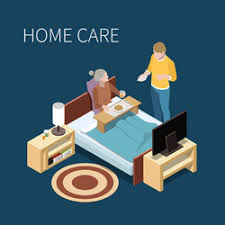 Care workers – it’s not a shortage – it’s a crisis. People who need care workers will tell you – the media will tell you, and the industry will tell you. From the national home care associations, a report in March: “The workforce shortage in home-based care has reached crisis proportions. Despite the best efforts of industry leadership and management, the gap between the numbers of patients and families seeking assistance and the availability of workers to provide that care is accelerating at an unsustainable pace. Home health care providers currently report turning away over 25% of referred patients due to staff shortages.”
Care workers – it’s not a shortage – it’s a crisis. People who need care workers will tell you – the media will tell you, and the industry will tell you. From the national home care associations, a report in March: “The workforce shortage in home-based care has reached crisis proportions. Despite the best efforts of industry leadership and management, the gap between the numbers of patients and families seeking assistance and the availability of workers to provide that care is accelerating at an unsustainable pace. Home health care providers currently report turning away over 25% of referred patients due to staff shortages.”
Insurers see the opportunity in care in the home. Optum, a division of United Health Group, has launched a $3.3 billion bid for home health company, Amedisys, part of a trend to move as much care from the hospital to home. Meanwhile, Humana’s CenterWell Home Health subsidiary, serving 350,000 patients across 38 states, has acquired Trilogy Home Health, adding another 11 locations in Florida. Even hospital systems see the importance of moving treatments into the home.
Home care organizations are caught in the crosshair of trends. The continuing desire to age at home, Medicare rate cuts combined with staffing shortages, affordability of home care reaching smaller percentage of the people who need it, shortage of available workers – all seem like the perfect storm. It demands efficiencies and technologies that have continued to largely elude home care and senior living industries.
Can use of AI help care organizations and their workers? Research has already shown that AI can help with many aspects of older adult care. But can AI really help with senior care work? This new report project, launching next week, will attempt to answer that question. In the meantime, why not ask ChatGPT – “What is the future of AI and senior care work?” Consider this response as research starting point:
"The future of AI in senior care work holds significant potential for improving the quality of care and addressing the challenges posed by an aging population. Here are some key areas where AI is expected to have an impact:
1. Personalized care plans: AI can analyze large amounts of data, including medical records, sensor readings, and genetic information, to create personalized care plans for seniors. It can help in diagnosing and monitoring chronic conditions, predicting health risks, and suggesting appropriate interventions.
2. Remote monitoring and telemedicine: AI-powered sensors and wearable devices can monitor vital signs, activity levels, and sleep patterns of seniors in real-time. This data can be analyzed to detect any abnormalities or changes in health, enabling early interventions. Telemedicine platforms can also leverage AI to provide virtual consultations, reducing the need for seniors to travel for routine check-ups.
3. Fall detection and prevention: AI algorithms can analyze video feeds from cameras placed in seniors' homes to detect falls or other accidents. Real-time alerts can be sent to caregivers or emergency services, ensuring timely assistance. AI can also help identify fall risk factors and provide recommendations to prevent falls through home modifications or exercise programs.
4. Cognitive assistance: AI-powered virtual assistants and chatbots can assist seniors in managing medication schedules, providing reminders for appointments, and answering questions related to their health. These virtual companions can also engage seniors in social interactions, reducing feelings of loneliness and isolation.
5. Robotic assistance: Robots equipped with AI capabilities can assist with physical tasks such as lifting heavy objects, providing mobility support, or helping with household chores. These robots can also be programmed to provide companionship and emotional support.
6. Caregiver support: AI can assist professional caregivers by automating administrative tasks, scheduling appointments, and coordinating care plans. It can also provide recommendations and decision support based on best practices and past outcomes, enabling caregivers to make more informed decisions.
7. Social engagement and mental health support: AI-powered technologies can facilitate social interactions for seniors through virtual reality, video chat platforms, or social robots. These technologies can combat feelings of loneliness and depression by providing companionship and engaging seniors in meaningful activities.

 Care workers – it’s not a shortage – it’s a crisis. People who need care workers will tell you – the media will tell you, and the industry will tell you. From the
Care workers – it’s not a shortage – it’s a crisis. People who need care workers will tell you – the media will tell you, and the industry will tell you. From the
Comments
LifeBio and MyHello both use AI at the core.
So many great innovations ahead. Laurie--thanks for pulling together the list. LifeBio is using AI for processing of voice recordings (600 in nursing homes across MN and 250 in TX in process throughout 2023) to summarize care notes/action plan to use a person's own preferences in their care. Ultra personalization of care made easier with the help of AI's speed to process this. LifeBio's MyHello program uses AI to match health plan members to other health plan members for social engagement. No one wants to just be known by their medical needs. Social health is real.